Research is limited, but there’s evidence the fermented tea offers some health benefits
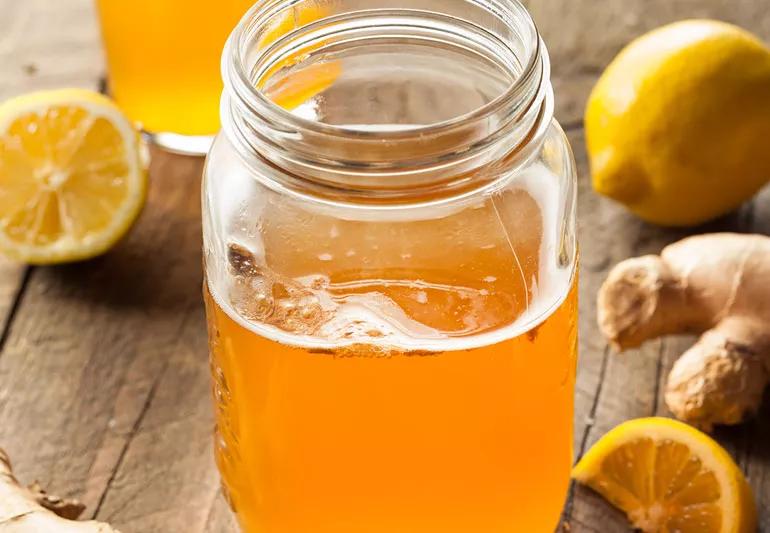
Kombucha dates back more than 2,000 years. But you’re forgiven if you think the tea only just emerged as a must-have tonic.
Advertisement
Cleveland Clinic is a non-profit academic medical center. Advertising on our site helps support our mission. We do not endorse non-Cleveland Clinic products or services. Policy
The popularity of this fermented and slightly fizzy drink exploded in the past decade, with worldwide sales totals growing from the millions to billions. Kombucha now holds prime real estate on many store shelves.
So, what’s powering this kombucha boom? Chalk it up to the beverage’s ballyhooed reputation as a health elixir that can help you shed extra pounds, fight illness and keep your ticker in tip-top shape.
But are those claims reality or just marketing magic? Let’s take a look with registered dietitians Julia Zumpano, RD, and Maxine Smith, RD.
Kombucha qualifies as an ancient concoction given a birthdate that includes B.C. It’s a fermented drink made from:
The brew typically sits and ferments anywhere from a week to a month. The end result is a lightly carbonated drink that typically carries a vinegary taste. (“It has a very specific tang in any flavor,” says Zumpano.)
The fermenting process adds a bit of alcohol to kombucha. We’re not talking cocktail-level booze, though: Alcohol levels are typically below 0.5%, allowing traditional kombucha to be sold as a nonalcoholic beverage.
Advertisement
Video content: This video is available to watch online.
View video online (https://cdnapisec.kaltura.com/p/2207941/sp/220794100/playManifest/entryId/1_vx0majbe/flavorId/1_5f3sgelj/format/url/protocol/https/a.mp4)
Probiotics are “healthy little microbes” in kombucha that can do a lot of good in your body. Many of kombucha’s touted benefits are similar to those of other fermented foods, like sauerkraut, pickles, kimchi, kefir and yogurt.
But research on what kombucha truly does for your health is somewhat limited: “There aren’t a lot of good quality, robust studies to support a lot of kombucha’s hype,” says Smith.
But Smith notes that compounds contained in kombucha have been associated with body-boosted benefits. Let’s review some of the touted claims and what’s worth believing.
Don’t count on a few bottles of kombucha to get your body toned and trim for swimsuit season.
“I wouldn’t expect to see weight loss If you’re just drinking kombucha and not making other diet and exercise changes,” says Zumpano. “It’s not that easy. We might wish that is it, but it’s just not.”
But drinking kombucha can be a positive step within a weight-loss plan — especially if you use the tea as a replacement for nutritionally empty soda. Just be cautious about what kombucha you buy if you’re counting calories.
“Some types of kombucha are more sweetened than others, so try to choose one with lower amounts of sugar,” advises Zumpano.
Another potential weight loss perk? The little bit of caffeine found in kombucha may help rev your metabolism to burn more calories. Research has shown that caffeine can promote weight and body fat reduction.
Kombucha is loaded with antioxidants and polyphenols that work overtime to protect your body from damage. This can help limit chronic inflammation that can lead to health issues such as heart disease, cancer and arthritis.
“Polyphenols are known to act as strong antioxidants in the body and decrease inflammation, which is the root cause of many diseases and conditions,” explains Smith. “And the fermentation process actually increases the amount of polyphenols.”
But kombucha shouldn’t be viewed as a magic solution for inflammation.
“Drinking kombucha alone is not going to suppress your entire body’s inflammation,” cautions Zumpano. “But if you combine kombucha with an anti-inflammatory diet, such as the Mediterranean diet, it can help. Take a whole-picture approach.”
Not all bacteria are bad. Want proof? Consider your gut. “Good” bacteria are essential for your gut microbiome to thrive — and fermented foods such as kombucha contain probiotics to help keep those levels high.
Advertisement
“Kombucha can really help feed and increase that good, healthy gut bacteria, which can help decrease any bad bacteria,” says Zumpano. “Maintaining that balance can have positive benefits on your digestive system and overall health and longevity.”
The nutritional resume of kombucha also includes hefty amounts of B vitamins, which are key to keeping your immune system humming along.
The fermented tea also is high in acetic, glucuronic and D-Saccharic acids. These organic acids can be antimicrobial, making them something of a superhero in the fight against bad bacterial growth, says Smith.
Polyphenols deserve a mention here, too, as they can help regulate your immune system in addition to knocking down inflammation.
Could kombucha be a useful ally in the fight against cancer? Some research suggests that antioxidants found in the fermented tea could offer some protection against the disease.
“Cell damage leads to can lead to cancer and other diseases,” says Zumpano. “The more cells we protect with antioxidants, the less damage we have — and that can really help suppress the risk of cancer.”
Enzymes and acids in kombucha can assist your liver as it gets rid of undesired compounds in your body, says Smith. Some research even suggests kombucha may have potential as a therapeutic dietary supplement to combat fatty liver disease.
Advertisement
A healthy diet is key to protecting your heart — and there’s evidence that some sips of kombucha may benefit your ticker.
Studies show that kombucha can increase your “good” HDL cholesterol and decrease your “bad” LDL cholesterol, notes Zumpano. (Here’s a quick refresher on the difference between HDL and LDL cholesterol.)
“Kombucha has been shown to limit the plaque that can build up in your arteries, which is what we really want to prevent,” she adds.
Drinking too much kombucha could potentially lead to reactions like headache, nausea, GI distress or going into ketoacidosis (a medical emergency where there’s too much acid in your blood).
“Lead toxicity is also possible if homemade kombuchas are fermented in clay vessels or other containers that leach lead into the finished beverage,” warns Smith.
Sanitation also can be an issue when brewing a homemade batch of kombucha. The drink can become tainted if it’s contaminated with undesirable fungi and overproduction of yeast, she adds. (Watch for odd coloring or a smell that resembles nail polish.)
“Most of the commercially packaged kombucha at the store is perfectly fine,” Smith reassures. “But if you’re at some random flea market and there’s a kombucha table, it might not necessarily be the best place to get it.”
Advertisement
The Centers for Disease Control and Prevention advises that drinking approximately 4 ounces (oz) of kombucha per day “may not cause adverse effects in healthy persons.”
Note that most kombucha bottles sold at the store are more than 4 oz. Check recommended serving sizes before chugging down a whole container. If you’re new to kombucha, it’s best to start slow.
Limiting the portion size will help keep added sugars in check, too, notes Smith. Check the nutrition label for the “added sugar” content, keeping in mind that 4 grams of added sugar equals 1 teaspoon of sugar.
If you’re pregnant or have a compromised immune system, it’s probably best to find another drink of choice, says Smith. Kombucha is generally not recommended for young children, either.
Kombucha offers a lot of potential health advantages. Is there an abundance of research backing up those claims? Not exactly, cautions Zumpano — but it’s hard to argue against there being some benefit.
“A lot of people get introduced to kombucha while moving toward a healthier diet and lifestyle,” says Zumpano. “It’s certainly worth trying and you may see great results. Just don’t overdo it or expect too much.”

Sign up for our Health Essentials emails for expert guidance on nutrition, fitness, sleep, skin care and more.
Learn more about our editorial process.
Advertisement

Catechins (antioxidants) in green tea help fight inflammation and diabetes, while improving memory and heart health
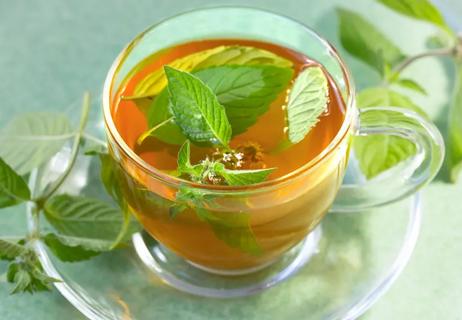
This subtly minty beverage can help balance hormones and loosen stiff joints
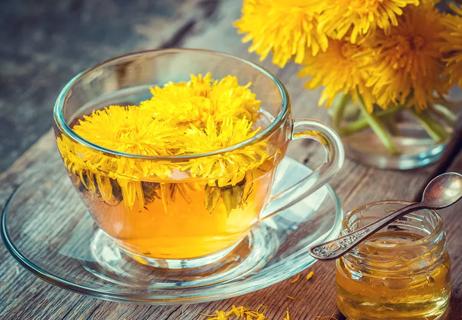
Weeds be gone! This tea contains lots of antioxidants and may help reduce inflammation

Flavonoids in black tea are good for your health, helping prevent strokes and heart disease
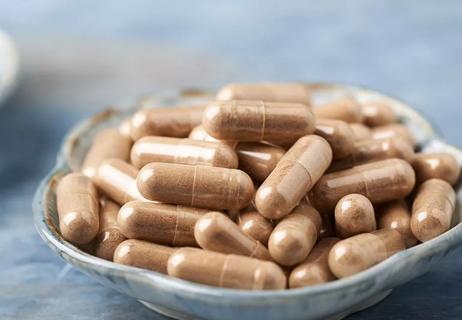
The energy drink staple packs a caffeine punch, but caution is recommended

From antioxidants to anti-inflammatory effects, a dietitian explains all
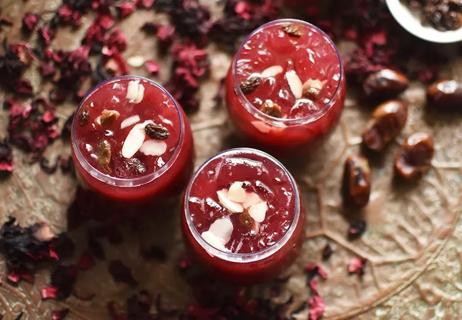
There’s a perfect tea option for every condition

Study reveals hot tea can raise esophageal cancer risk

Even small moments of time outdoors can help reduce stress, boost mood and restore a sense of calm

A correct prescription helps your eyes see clearly — but as natural changes occur, you may need stronger or different eyeglasses

Both are medical emergencies, but they are very distinct events with different causes